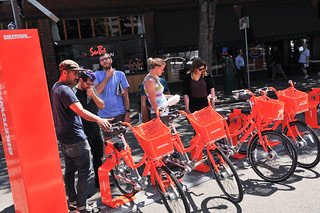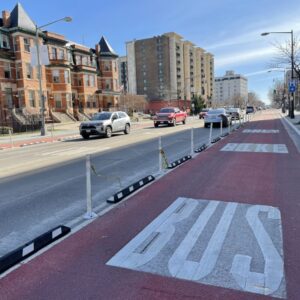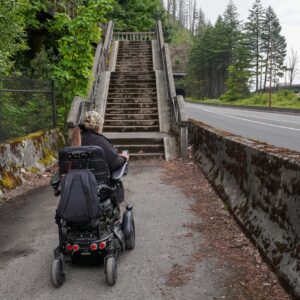Anyone who acts to protect themselves from a clause buried in the Biketown contract that prompts users to waive their jury-trial rights is protecting themselves permanently, the bike share operator says.
At issue is a “binding arbitration” clause in section 15 of the long rental agreement to which people must agree in order to use the public system. Such clauses, which are designed to prevent class actions and other customer lawsuits, are increasingly common for credit card companies and other corporations but are rare among public bike share systems.
But as we reported Thursday, the contract includes a way for Biketown users to protect themselves: you have to send an email with a particular subject line to a particular email address mentioned in the contract.
In a pair of emails to BikePortland Thursday and Friday, a spokeswoman for Biketown’s New York-based operator Motivate offered two clarifications:
1) Permanent protection: If someone uses Biketown — whether for a single trip, a single day, or as part of an annual membership — and then sends the necessary email within 30 days, they’ll be protecting their jury rights for anything that might go wrong on all future rides. “If an individual opts out once we will honor that individual’s opt-out for future pass purchases,” Motivate Director of Communications & External Affairs Dani Simons wrote.
2) Multiple chances to act: If someone fails to send the required email within 30 days of their first use and then uses the system again, they get another 30-day chance to send the email and permanently protect their rights. “If someone lapses and then rejoins they will have an additional 30 days to decide if they want to opt-out,” Simons wrote.
It’s worth noting that though these promises come from a Motivate executive, they’re not actually written into the contract that Biketown continues to force users to agree to. Motivate might someday argue that Simons’ commitments in the media now aren’t legally binding.
Advertisement
Here’s the section in question:
You have the right to opt out and not be bound by the arbitration and class action waiver provisions set forth above by sending written notice of Your decision to opt out to legal@motivateco.com with the subject line, “ARBITRATION AND CLASS ACTION WAIVER OPT-OUT.” The notice must be sent within thirty (30) days of Your first use of the Services, otherwise you shall be bound to arbitrate disputes in accordance with the terms of those paragraphs.
Mark Ginsberg, a Portland plaintiff’s attorney who specializes in biking issues, noticed the clause on Wednesday. After our coverage Thursday morning, Oregonlive and Willamette Week have followed up. Ginsberg said Friday that KATU-TV is running a piece of its own Friday evening.
On Thursday we did a scan of various public bike-sharing user agreements around the United States and found that the systems in New York City, Chicago, Washington D.C., Boston, Philadelphia, the San Francisco Bay and Los Angeles all lack binding arbitration clauses. The only ones we could find that do have them are in Portland, Seattle and Phoenix.
— Michael Andersen, (503) 333-7824 – michael@bikeportland.org
Our work is supported by subscribers. Please become one today.








Thanks for reading.
BikePortland has served this community with independent community journalism since 2005. We rely on subscriptions from readers like you to survive. Your financial support is vital in keeping this valuable resource alive and well.
Please subscribe today to strengthen and expand our work.
It is sad that whenever an individual or corporation tries to do anything, attention focuses on who can get what compensation and how so quickly.
You gotta wonder why a company providing bicycles feels this measure is necessary, but you also gotta wonder why people who ride bicycles would be so concerned about their rights to sue.
Yeah!! When has a person or corporation ever done something to hurt anyone?
Probably about as often as people figure out how to extract as much money as possible from one for any reason they can.
The whole tempest in a teapot is protecting a right to a jury trial should you somehow manage to injure yourself while operating a slow moving bike because you couldn’t reasonably figure out it couldn’t stop, go, or steer properly.
If one of these bikes were to become unsafe, it’s most likely to be a result of vandalism — obviously the company’s fault.
It’s a bike for cryin’ out loud and these things are probably a lot safer and certainly better maintained than most people do for their own bikes.
Coming up with a scenario where someone would have legitimate cause to sue for a bunch of money requires real mental gymnastics.
Some people have a fear of lawyers and exaggerate frivolous lawsuits. But that people seem so concerned about how they’re going to sue shows they also don’t have a very good sense of proportion in evaluating threats.
Except people who are so up in arms about their ability to sue because of concerns about operating a simple vehicle that hardly anyone moves faster than a decent running pace.
Such people should be required to wear full face helmets and body armor, though they should carefully check the rights associated with any individual product before using it. Or better yet, they might find it safer to get around in a metal safety cage on a much more stable 4 wheel platform.
I see that tires were slashed on N. Williams bikes. Bets are on: Nike yanks these bikes and cancels the program. Sometimes people don’t appreciate what’s best for them.
I’d like to take you up on your bet.
Nawh! Hope the last rider that rented the bikes that had the tires slashed signed the opt out disclosure and the riders (same thing) that had rented the bikes that got tagged. The expence of cleaning the bikes and replacing the tires will be billed at triple expence.
Let me know when it’s easy to sue the city for bad design.
I am glad I live in a city that 1: has “bike lawyers” and 2: has people looking end-user agreements with this level of granularity.
Maybe if we had real health care, people wouldn’t cherish the need and right to sue. Arbitration benefits the corporation, of course, not the customer. Corporations already have the constitutional rights of people, because they ARE people my friend. This arbitration gives them extra advantage over the customer, actual real, vulnerable citizens. Thank you Mark Ginsburg.
just another reason I will not ever use the system..